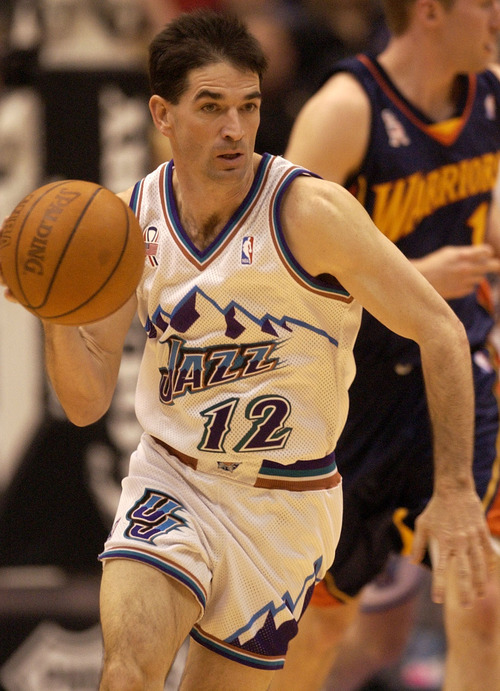This is an archived article that was published on sltrib.com in 2013, and information in the article may be outdated. It is provided only for personal research purposes and may not be reprinted.
As his soon-to-be-released autobiography Assisted again proves, those who underestimate John Stockton do so at their own risk.
Stockton? Writing a book? About himself?
The idea is inconceivable to those who followed his journey through 19 seasons in the NBA.
During his career — spent entirely with the Utah Jazz — Stockton was the NBA's version of Howard Hughes. He was the league's mysterious recluse who gave few the opportunity to know him.
Stockton avoided the spotlight and fought — stubbornly sometimes — to prevent outsiders from getting more than a glimpse of his life away from basketball.
"I've been accused sometimes of being a hermit," Stockton said last week. "[But] my feelings about privacy have never changed and probably never will. Everybody deserves that."
In Assisted, however, the intensely private basketball star successfully makes the transition to entertaining author.
The anecdotes Stockton shares in his book are often witty, poignant and self-deprecating. He gives readers a truly unique look at his career and his relationships with those who helped him along the way — from St. Aloysius school in Spokane, Wash., to the Naismith Basketball Hall of Fame.
Assisted, scheduled for release by Deseret Book on Oct. 28, probably won't go down as one of the great sports-related books ever written. It's not The Boys of Summer, Instant Replay, Friday Night Lights, Seabiscuit or Ball Four.
In fact, Assisted is the G-rated opposite of Ball Four, the controversial tell-all book by ex-pitcher Jim Bouton about his experiences during the 1969 Major League Baseball season.
"I tried to be careful because there are names of loved ones in there — family loved ones, team loved ones and loved ones in the [Jazz] organization," Stockton said. "I just didn't think it was my job to tell the world about Karl Malone or anyone else."
Stockton wrote the book, with an assist from his junior high coach and co-author Kerry Pickett, primarily as a way to focus on a meaningful project while his children were in school.
"It was a combination of things, but I had time on my hands," he said. "That was a big part of it. In the middle of the day, when the kids weren't around, I needed to find something I could sink my teeth into."
Back-to-back trips to the NBA Finals were the highlight of Stockton's career with the Jazz, of course. Utah lost twice to Michael Jordan and his Chicago Bulls.
By design, however, Stockton spends little time discussing the two series that broke Utah's heart.
"There were some great moments in there — great basketball, great plays [and] great victories," he explained. "But we lost. I didn't think it was my place to talk much about it. If you win, you get an open forum to talk about the last shot or the last rebound. If you lose, what's there to talk about?"
Stockton was a two-time member of the United States Olympic team. He was a member of the original Dream Team in Barcelona in 1992.
"Nothing compares to making that team — being asked to be on it," Stockton said. "That was a bigger accomplishment than actually winning the gold medal, if you ask me. What a team. What a team."
Stockton was picked for the Dream Team over Isiah Thomas. But rather than drive a wedge between the two fierce on-court rivals, the situation actually cemented what was already a friendship.
According to Stockton, Thomas called his father and apologized for the controversy and rhetoric surrounding the Dream Team roster.
Thomas told Jack Stockton he wanted to play in the Olympics with his son, not in place of him.
"Isiah did a number of things for me he didn't have to do," John Stockton said. "You can be a respected opponent and not do the things he's been willing to do for me."
Stockton's account of his decision to retire following the 2002-03 season is one of his book's highlights because of the insight it provides.
Stockton spent his final season mostly alone. Favorite teammates had moved on, and questions about what he would do once he "cut the cord" bothered him.
Even more troublesome: Some new teammates began to grumble about their roles behind Stockton and Malone. They complained of favoritism coach Jerry Sloan allegedly showed his 40-something stars by not making them participate in every practice.
"Things just started to add up," Stockton said. "Things that started to worry me had never worried me before. Things that started to bother me had never bothered me before. The aches and pains I felt, I had never felt before. My reaction to it — instead of attacking it — was an indication it was time [to retire]. That was the message."
When told it sounded like his final season was a truly unhappy one, Stockton said, "I don't want people to feel sorry for me. I had a great time. It was a great part of my life. But you can't play forever." —
The John Stockton file
Born • March 26, 1962
Hometown • Spokane, Wash.
College • Gonzaga
NBA career • 1985-2003
Position • Point guard
Height • 6-1
Weight • 175
Career highlights • Selected by Utah with the 16th pick in the first round of the 1984 draft. ... NBA's all-time assist leader (15,806). ... NBA's all-time steals leader (3,265). ... Scored 19,711 points in his career. ... Missed only 22 games in 19 seasons. ... Was a 10-time All-Star. ... Co-MVP of the 1993 All-Star Game at the Delta Center. ... Won gold medals with the U.S. Olympic team in 1992 and 1996.



